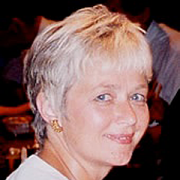I grew up in a family believing in the UN Human Rights Declaration, and the first book I recall being read to me was the UN children’s book. As I grew up, pen pals from various parts of the world colored my views of my safe middle-class upbringing in one of the world’s most ethnically homogenous and peaceful societies; Denmark.
I was told growing up that all human beings were alike in dignity and rights. As a medical student I joined Amnesty International and worked for the charity movement, Abbe Pierre, to raise money for developmental projects. I joined Nobel Peace Prize winner Pater Pire’s Peace University in Belgium and had wonderful social interactions with students from all over the world.
The feminist movement and political activities in the Social Democratic Party have been important parts of my life, and in medicine it was the community aspects that primarily interested me.
I was attracted to psychiatry for several reasons. One was an interest in women’s issues. Another was a wish to increase the dignity and human rights of the mentally ill. My mentor, Dr Annalise Dupont, the Director of the Danish psychiatric case register, gave me ample opportunity as a junior female doctor and paved my way into international psychiatry, along with Professor Erik Strömgren, who took me to WHO, where I participated in one of the WHO IPSS meetings.
The cosmopolitan atmosphere at the WHO meeting influenced my career. Professionally and personally these were very formative years, enabling me to develop international professional networks, as well as friendships. I am now a member of the WHO Expert Advisory Panel on Mental Health.
On the personal level, I had become the partner of an Indian scientist who settled as a professor in Denmark and taught me more about culture than anyone else. Close contact with his family in India opened my eyes to a culture and way of life that has been dear to me ever since.
My psychiatric career was centered around Copenhagen, but with interests that had an international flavor. Via Amnesty International I got in contact with Dr Inge Genefke, the founder of the work in Denmark with torture survivors. I was a volunteer examiner of asylum seekers, and had from its very start, close contact with the Rehabilitation and Research Center for Torture Victims.
As a member of the Danish Medical Association Ethics Committee, the human rights agenda further led to the establishment of interdisciplinary educational activities in Eastern Europe, with a focus on professional ethics and the rights of patients.
And I have been lucky that the European Council’s Committee for the Prevention of Inhuman, Cruel and Degrading Treatment and Punishment has used me as an expert on a number of missions visiting prisons and psychiatric facilities around Europe, focusing on patients’ rights and access to care.
From the beginning of my psychiatric career I have been active in international organizations and found it a challenge to be part of multicultural groups working for a common goal. I was fortunate enough to be elected in 1996 to the Executive Committee of the World Psychiatric Association, where I chaired the Standing Committee Reviewing the Abuse of Psychiatry and received cases from many parts of the world.
Almost at the same time I decided to leave my position as Head of the Department of Psychiatry of Copenhagen University and become the Medical Director of the Danish Rehabilitation and Research Center for Torture Victims, with projects helping traumatized people in a number of countries.
After the reorganization of the Center I decided in 2001 to return to psychiatry and became Head of the newly established National Center for Transcultural Psychiatry at the Department of Psychiatry, Rigshospitalet, Copenhagen; with the aim to set cultural aspects on the psychiatric agenda.
Cultural issues are central in my work in the establishment of a Nordic Transcultural Network of Psychiatrists and Psychologists, as well as with my membership of the WPA Transcultural Section and now the WACP also.
I welcome the inauguration of WACP and look forward to fruitful collaboration with colleagues around the globe who share the same interests.
October 5, 2006

